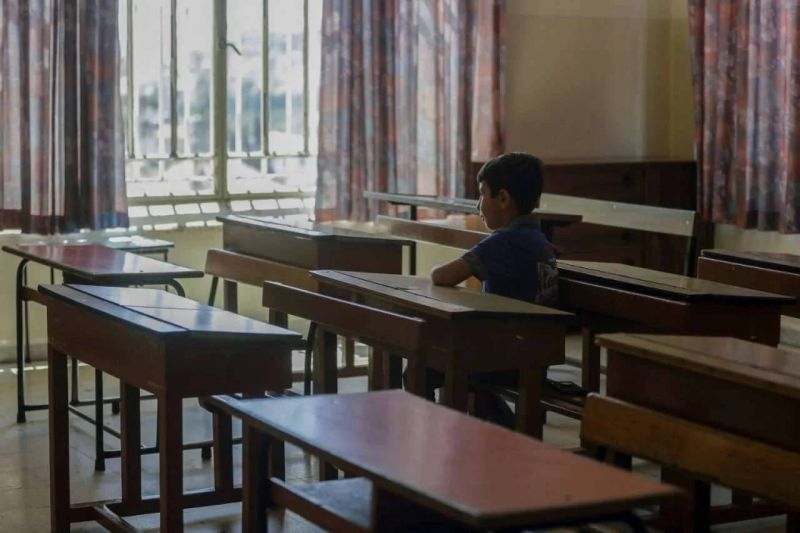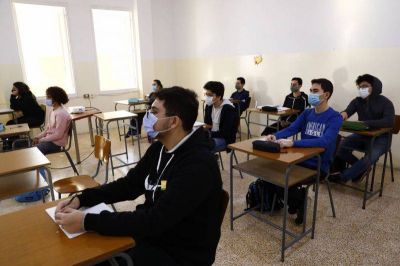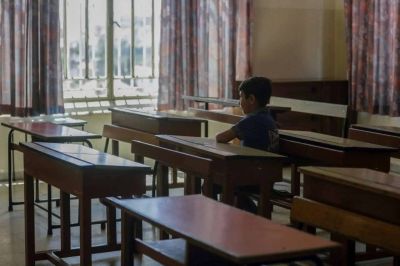
A student in a classroom in Lebanon (Credit: Joseph Eid/File Photo/AFP)
The resumption of classes in public schools in Lebanon, announced by two different unions for Monday after a two-month strike, is likely to be largely boycotted by some teachers, who refuse to teach until they have won a series of demands, several teachers and union leaders contacted by L'Orient-Le Jour said Sunday.
Since the beginning of January, teachers have been demanding a salary increase and transport allowances, as well as medical aid.
On Feb. 27, the caretaker cabinet approved a proposal to grant teachers additional support by subsidizing 5 litres of fuel per teacher per working day.
This decision was deemed insufficient by public school workers who have not yet received salaries due since the beginning of the year.
Several cards in hand
When contacted by L'Orient-Le Jour, the secretary-general of the official secondary school teachers' union, Haydar Khalifeh, who represents the tenured teachers, affirmed that they will "partially" suspend their strike as of Monday, noting, however, that "some [teachers] have shown their willingness not to follow this decision."
"Our strike has partially achieved its goal: we will get some of our demands and received promises," he added.
Productivity allowances for the first three months of the school year should be paid, as well as the five liters of petrol offered for each day worked, he said.
"We still hold several cards, including the official exams deadline," if the rest of the demands are not met, he continued, suggesting that teachers could boycott exam preparation and the invigilating of these exams.
In a statement issued on Sunday, the committee of secondary school contract teachers in public schools also announced the "resumption of classes on Monday" and called on school administrations to open the doors of public establishments, even if it means that "not all classes will be given, depending the people present."
"If the tenured teachers were suffering like us, being deprived of their salaries when they are on strike, they would not have suspended their work for one single day," the statement added. Unlike their tenured colleagues, contract teachers are not due any payment while on strike.
Limited financial capacity
The decision to return to class, however, is not unanimous among contract teachers.
"The return to school will be boycotted by many teachers. The majority of us cannot go to work because of our limited financial capacity," said Muntaha Fawaz, a representative of the secondary contract teachers' union.
She expressed disappointment that "the promised transport allowances will only be paid in April."
The teacher explained that contract teachers expect to "receive $100 this Monday and $200 on March 20," in relation to salaries due for the last three months of 2022.
"If this promise is fulfilled, we will then decide" whether to resume classes, she added.
Hassan Serhan, who is a member of yet another union for contractual and intermittent teachers, said that "many contractual workers will not respect the lifting of the strike tomorrow."
According to him, this decision was taken "because of political pressure, exerted by certain parties who want to save the school year, and by the Ministry of Education."
"This school year is a failure for the students," he said.
On Feb. 14, the United Nations Children's Fund (UNICEF) warned that the prolonged closure of public schools in Lebanon had caused "significant and persistent damage to children's learning, mental and physical well-being and safety."
"When schools close, early marriage increases, exploitation, sexual abuse and child labor increase. The impact will be devastating on the future and wellbeing of children and young people, their families, and on Lebanon's prosperity," UNICEF warned.
According to a World Bank report, "one lost year of schooling would translate into losses for the Lebanese economy of up to US$2.5 billion in the coming years," the UN fund added.

